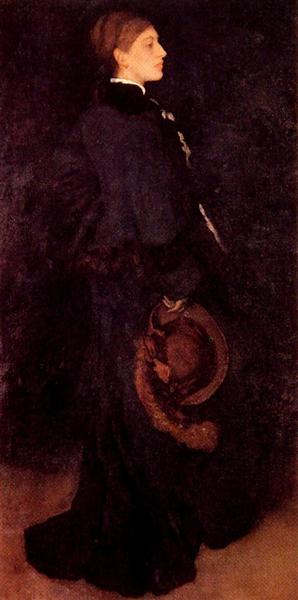Description
The work "Arrangement in Brown and Black: Portrait of Miss Rosa Corder - 1878" by James McNeill Whistler is a testimony of the domain with which the American painter reflected not only the human figure, but also the atmosphere and character. In this composition, Whistler presents Rosa Corder, a well -known model and artist of the time, in a format that highlights her serenity and elegance.
The painting is impregnated with the aesthetics of "tonalism", a movement promoted by Whistler throughout his career, which accentuates the use of limited colors and subtle interaction between light and shadow. This portrait, in particular, is an eloquent example of the application of the dominant tone the brown and black that cohesive the entire work, imbueting the figure of Corder of a serene gravity.
In "Brown and black arrangement," Whistler opts for a simple but effective composition. The figure of Rosa Corder is centered, in front of the viewer, with a pose that radiates calm and introspective dignity. She holds a small book or notebook in her right hand, while the left rests on her lap, which underlines her reflective character. Corder's clothes, a dark dress without ostentatious ornaments, melts with the background, which attracts attention to his face. This repetitive treatment of the figure on a dark background is also observed in other works by Whistler, as in his famous "portrait of the artist's mother" (1871).
The choice of colors, predominantly brown and black, seems to reflect the psychological complexity of the subject, avoiding any unnecessary chromatic distraction. Whistler achieves with a mastery that the integration of the tonal elements is now fully perceived. Darkened brown nuances and soft blacks create a visual elegy that framed Rosa Corder in an almost ethereal atmosphere but at the same time tangible and concrete.
Through an attentive scrutiny of the work, revealing details about Whistler's technique emerge. The soft contours and delicate shadows are proof of their almost musical approach to the painting, looking in their works a harmony comparable to the one in a very composite musical piece. This feature is, in effect, in correspondence with its well -known inclination for synesthesia between music and painting, the concept of "arrangements" and "symphonies" in its degree of works.
It is also remarkable to consider the historical context in which this portrait was conceived. Made in 1878, in full apogee of Whistler's career, it was a time marked by his constant search for recognition in the European artistic panorama, as well as his controversial techniques and theories that often challenged Victorian conventions.
Miss Rosa Corder, in addition to being her model, was a renowned dilettant of the London artistic circle, which adds an additional layer of meanings about the portrait: it is not only about the capture of a figure, but about the representation of a mutuality intellectual and artistic between the painter and his subject. Each brushstroke and each shadow seem to delineate not only its physical appearance, but also its position as a woman of distinguished culture and personality.
In summary, "Brown and black arrangement: Miss Rosa Corder's portrait - 1878" by James McNeill Whistler is a masterpiece that reflects the artist's skill in the capture of human essence through tonal minimalism and serene composition. Invites the observer to a leisurely contemplation, where every detail cohesive a subtle but deep narrative about the introspective and cultural character of Rosa Corder. This portrait is erected as a testimony of Whistler's talent to merge the technique, theory and emotion in his works, occupying a significant place in the collection of the art of the nineteenth century.
KUADROS ©, a famous paint on your wall.
Hand-made oil painting reproductions, with the quality of professional artists and the distinctive seal of KUADROS ©.
Art reproduction service with satisfaction guarantee. If you are not completely satisfied with the replica of your painting, we refund your money 100%.

